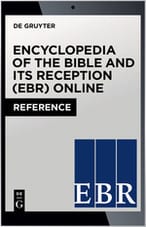Biblical archaeology: An Interview with Aren Maeir
Professor Aren Maeir specializes in biblical archaeology. We talked to him about his field of expertise and his role as an editor for the Encyclopedia of the Bible and Its Reception (EBR).
This is the fourth part of an interview series dedicated to the EBR (Encyclopedia of the Bible and Its Reception Online). EBR is a research tool for scholars in biblical studies and related fields
De Gruyter: Could you introduce yourself?
Aren Maeir: I’m Aren Maeir, I’m a professor for archaeology at Bar Ilan University in Ramat Gan, Israel. My field of expertise is Biblical archaeology, Bronze and Iron Age archaeology, and I excavate at Tell es-Safi, Gath of the Philistines. I’ve been on the EBR team for about a decade and I’m the editor responsible for the field of Biblical archaeology.
DG: Can you tell us a little bit more about your area of expertise and your research?
AM: I deal with the archaeology of the Levant, more or less the Land of Israel, Palestine, whatever you want to call it, and the Bronze and Iron Ages, which represent the periods before the Old Testament and the Iron Age, which is the early age of the Old Testament. It’s more or less parallel to the Canaanite cultures, the Israelite cultures, the Philistine cultures. I deal a lot with the Philistines, as I excavate a Philistine site, but have also a lot to do with the Iron Age cultures of the Land of Israel, such as the Kingdom of Israel, the Kingdom of Judah, and various related issues. The connection to EBR is that I give the input on the articles, or lemmas, that have to do with archaeology and related issues, particularly related to the HEBRew Bible and Old Testament.
DG: Does your task go beyond just getting input?
AM: So, when the editors meet, or when we go over the draft of the volumes, very often I have input also beyond, into fields that are not directly archaeology, whether it’s into HEBRew Bible, whether it’s the ancient Near East, or adding perspectives from my fields of expertise to lemmas that are related.
DG: So, what’s it like to work in that kind of team? How would you describe the team at large and what was it like working with them?
AM: Well, first of all, it was very nice, because it adds for myself additional perspectives from people who are big experts in their fields. So, participating in the meetings is always a really enriching and enlightening experience and it’s also nice to work together with different perspectives to hammer out how a lemma should be dealt with, or to bring up new topics that need to be dealt with. I find it also particularly interesting all the various skills that are put into it, both in the meetings, but particularly with the finished volumes. I’ll just skim through, and I skim through all kinds of interesting topics that I usually have nothing to do with and it’s a chance to learn about something new.
DG: Who do you see the finished product for? How do you see it being used?
AM: I think the Encyclopedia is really for anybody who has any interest of any sort in the Bible. Whether it’s from an archaeological point of view from the ancient world, way to completely modern manifestations of the connections of the Bible, and anything in between. I think it’s for sure connected to any scholar who deals with the Bible in any way, scholars who deal with the archaeology of ancient Near East, and not only Biblical archaeology per se, and of course, anything that has to do with the reception. The coverage is very broad, that’s what’s so nice about it.
DG: You worked on a number of different projects for De Gruyter, what was it like working as an editor with De Gruyter?
AM: In addition the EBR project I’m the editor of a series which is slowly forming, which will be related to the EBR, which will be the Archaeology of the Biblical Worlds. We hope to have one or two volumes coming out within a year or so and hopefully that will be a series that can go on and I will say be really useful for EBR users that are more interested in delving deeper into the issues of the connections of Bible and archaeology and ancient New East.
DG: Anything that you would like to add?
AM: I think EBR is something that every university library should have. Because it’s a very, very broad encyclopedia covering much more than just the Bible. And I think anybody interested in religion, cultures, the interaction between different cultures in relation to the bible, there’s a lot to learn there.
[Title Image by diy13 on Getty Images ]
